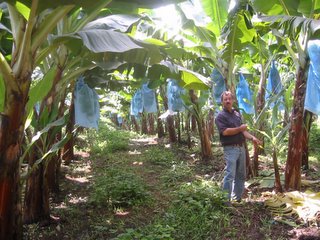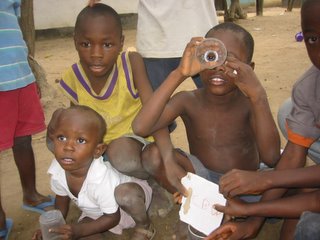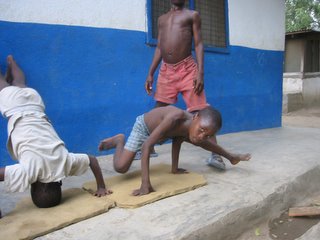
Last weekend a number of us, being the good liberals that we are, took an educational sojourn to a fair trade banana farm. One of the volunteers is a rather active fair trade campaigner in Australia and her inquiries led her to contact Hub, Ghana’s first fair trade banana farmer, who agreed to give us a tour of his operation. Hub is every bit your image of the intrepid farmer. His face is leathery and tan from days in the sun, his manner is unassuming yet straight-shooting and one of his digits (middle finger, left hand) is missing, likely taken in some industrial farming accident. He generously took around his 500 acres in his rustic blue pickup explaining the ins and outs of the fair trade business and the finer points of banana farmer, talking (in a thick Dutch accent) about the “verkersh harveshting dee bananas.”
Hub had begun his tropical farming career in the Ivory Coast in what he described as pretty primitive conditions. After that, nearly 13years ago, having fallen in love with a Ghanaian woman, he moved here to try his luck at farming the land in the Volta region. Hub was not drawn to the fair trade game due to any kind of outrage over multinational exploitation of disempowered native workers, but because without fair trade he would not have been able to overcome the trade barriers that were keeping him from exporting his produce.
A complicated set of European trade restrictions that gave former colonies preferential treatment in exporting produce was phased out when the EU was established, technically permitting a flood of cheap produce from many parts of the earth to all over Europe. But to take advantage of this new rule producers had to be already exporting to Europe before the EU was established. Because no one had seen it profitable to export bananas from Ghana before this rule, no one could take advantage of this newly lifted trade barrier. OK. I think I have this part of the story correct so far, but trade regulations are by design complicated partly (to be cynical) so that those with the slickest lawyers get the best deal. Not being a slick lawyer I may have screwed up one of the finer details. Anyway, point is Hub was priced out of the banana game, and a part of the world that could grow bananas most efficiently was prevented from selling to the part of the world that would pay the most for them (the opposite of what free trade enthusiasts advocate). But with a fair trade label stuck to his produce, Hub could circumvent some of these trade restrictions and command enough of a premium in European markets to make a profit.
Many of us are familiar with the term “fair trade”, but we know it as a tiny niche market for select goods (like chocolate, coffee and handicrafts) frequented mainly by us liberal yoga-practicing organic oat-eating do-gooders. However, in Europe, there are entire aisles of produce dedicated to fair trade products for the social conscious salad eater. The fair trade consumer can rest assured that the far off producer of their produce is getting a fair wage, the right to unionize, health and pension benefits, and paid overtime (conditions that, to make an obvious comparison, would make the average Walmart employee envious). The FLO (the Fair Trade Labeling Organization) visits the operation, or more often collective of small farmers, to ensure that these labor standards are adhered to, and awards them the official fair trade label which confers with it a premium at the selling point.
Hub’s banana fields flank the great Volta River and are nestled between rolling green hills. Monday through Wednesday his 500 workers tend to the fields for a 5 hour day while Thursday and Friday (the “harveshting” days) they put in a longer 10 hours. If they work on the weekends they get paid overtime. They are unionized and have a health policy and even, we were surprised to learn, maternity leave. Hub's farm puts $60,000 into the local economy each month, which of course helps generate and support other small businesses as well as the estimated 5 dependents per each of his workers. When profits from their fair trade premium were twice as much as expected last year, the workers had a say in determining where this extra $120,000 went. They voted on buying a bicycle for each worker so that their commute (otherwise potentially hours on foot) would become easier, and now blue “fair trade” bikes dot the region.
Last year Dole (maybe you’ve heard of this company) moved into the neighborhood after things got too unstable in the Ivory Coast next door, setting up a banana plantation ten times larger than Hub’s operation. Dole’s workers are paid daily with no contract (probably made it a lot easier to get out of the Ivory Coast when the going got rough) and paid five times less than Hub’s. These lower labor costs and the benefits of economies of scale from such a huge operation mean that without fair trade, Dole’s farm would have run Hub out of business last year.
One of the main arguments for free trade is that, while it is easy to paint multinationals as nefarious parasites, they
are providing much needed employment to workers whose alternatives are much worse. But the problem is that they can pull out of a country at any time when greener pastures emerge or when things get too prickly, leaving the situation worse than where they found it. But this is business and not social work, and it’s not surprising that there is no real loyalty to betterment of the country or to the workers and their families. But that’s precisely why our government has regulations to protect workers – because the competitive environment in which businesses operate does not select for expensive decisions that nurture workers or create a healthy society outside the company gates. Because there are no real global worker protections, mobile multinationals can game the system to their advantage. OK. That’s probably a sophomoric oversimplification of things, but that should give the uninitiated a bit of background. Back to Hub…
After the tour, Hub invited us to his house to relax and chat a bit more. Let’s just say, fair trade has been good to Hub. His house was unpretentious but beautiful; the pickup and farm tools in the garage clashed a bit with his leather sofa and high-tech sound system inside. Pictures of his farm and family and an impressive collection of Africana dotted his walls. It all seemed to fit what we knew of Hub so far. We convened in his backyard and relaxed in the gazebo overlooking the Volta drinking beer in the early mid-day. Life has not always been so comfortable. Farmers can experience a reversal of fortunes any year making it a risky investment. A few years ago, a disease in his fields wiped out his harvest and he nearly lost everything. He had to lay off almost all of his workers. But considering that they negotiated a 5 months severance package, Hub told us that most of his workers were asking to be fired. (The contracts required he pay even more which would have permanently shut him down, so the workers union agreed to the 5 months) He was able to start over, however, and has seen some very profitable years lately.
All of this was very heartening - one of those instances where everybody wins. And it is all due to the market of socially conscious consumers that are willing to pay a bit more to know that the workers who pick the fruit half a world away are being treated as they would want to be treated. I don’t know if it will be enough of a market to truly change the way global business is done, but it is a start.




